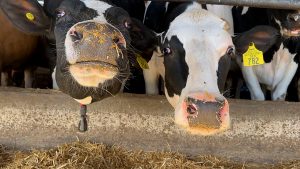
“If we can’t make something equitable, we shouldn’t have it,” said John Painter, a Tioga County farmer representing Pennsylvania Farm Bureau.
Wednesday’s Milk Marketing Board hearing on the over-order premium was the first since Farm Bureau’s November vote to support eliminating the payment.
Pennsylvania farmers receive the premium only if their milk is processed and sold in the state as beverage milk. Milk that crosses state lines, or is made into cheese or ice cream, is ineligible.
Those criteria provide an incentive for Pennsylvania processors to handle out-of-state milk while sending local milk elsewhere, said Tim Wood, a Tioga dairy farmer.
The Milk Marketing Board has been working to address farmers’ concerns since 2018, but that hasn’t been easy. An ill-considered change to the premium could trespass the clause in the U.S. Constitution that prevents states from regulating commerce with other states.
But farmer frustration has been smoldering since well before the current board leadership was installed. It finally boiled over at last year’s Farm Bureau meeting.
Wood said the group’s delegates initially voted on a resolution to withdraw support for the Milk Marketing Board itself. That motion was defeated before the vote to end the over-order premium passed by a roughly 2-1 margin.
“What is fair and equitable about a state-mandated regulatory pricing system that picks winners and losers among farmers all facing the same challenges?” Wood said.
At his farm, Wood said he doesn’t receive any money from the premium. His milk is processed in Maryland.
In advance of the hearing, the Ag Department submitted written testimony asking the Milk Marketing Board to consider reforming the premium, while Painter and Wood sent testimony asking the board to eliminate the payment.
The Pennsylvania Association of Milk Dealers asked the board to strike all or parts of these submissions, saying they went beyond the stated scope of the hearing — the level and duration of the premium.
Wendy Yoviene, an attorney for the milk dealers, said allowing the additional testimony would not have given her group’s accountants enough time to prepare analysis for a response.
The day before the hearing, the board allowed Painter and Wood to present their testimony, minus the passages deemed off topic.
Deputy Ag Secretary Greg Hostetter was allowed to present his agency’s testimony, but the board said it would not consider his statement when it set the premium.
Board Chairman Rob Barley said he recognized the importance of broad discussions about the over-order premium, but the timing didn’t work for this meeting.
“We want to work with each and every one of you to develop a system that is a strong, fair system,” he said.
“We’re here to be a partner as well,” Hostetter said.
Dairy farmer Matt Espenshade, representing Pennsylvania State Grange, and dairy activist Arden Tewksbury were among those urging the board to maintain the premium at its current level of $1 per hundredweight.
Espenshade said the premium will help farmers cope with rising input costs and continuing marketing deductions from milk checks.
Tewksbury championed the premium’s creation back in the 1980s, in part because the state was willing to listen to farmers’ concerns.
“You could not get the support from Washington,” he said.
Tewksbury also noted that Pennsylvania farmers who previously supplied the Readington Farms plant in New Jersey were losing the premium that processor had supplied.
Readington’s parent company, which also owns ShopRite grocery stores, decided last year to buy its milk from a third party. The company negotiated to get other markets for its former direct shippers.
The board is expected to announce the new over-order premium amount later this month. The premium is usually set for six months at a time.
























